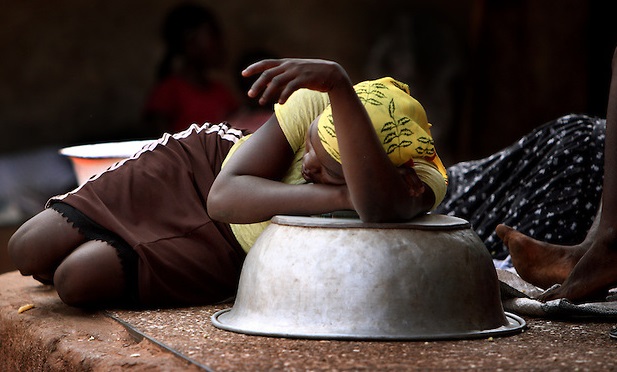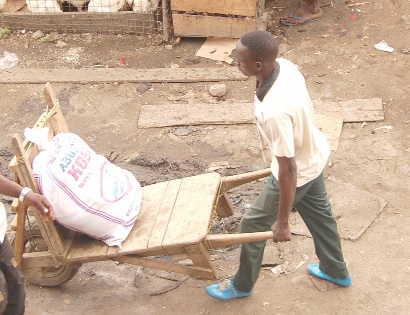Woes of Kayayei at the Kasoa Market
 “I have been raped 12 times since I moved from Walewale in the Northern Region to work as a Kayayo,” Mama Kodinu said, tears running down her cheeks as she spoke. As a head porter earning her keep at the Kasoa old market in the Central Region, Kodinu’s tales of pain and agony are heavier than the loads she carries for her daily butter and bread.
“I have been raped 12 times since I moved from Walewale in the Northern Region to work as a Kayayo,” Mama Kodinu said, tears running down her cheeks as she spoke. As a head porter earning her keep at the Kasoa old market in the Central Region, Kodinu’s tales of pain and agony are heavier than the loads she carries for her daily butter and bread.
Advertisement
Surprisingly, six of the rape incidents resulted in unwanted pregnancies. “I have had four abortions,” she said, wiping her tears while, at the same time, casting her eyes around for prospective clients.
With her were two children she claimed were the products of the last two sexual violations she encountered with three different unidentified men.
The 34-year-old currently sleeps in front of a provision shop at the Kasoa new market with her two daughters, Sibuinu, three, and Balengu, one and half years old.
At the old market, where Kodinu had been working since her relocation, there are many young girls under the age of 18 engaged in similar ventures for their daily bread.
Most of these girls are from the northern part of the country, such as Bimsi, Chopowa, Dugu, Daboya. Others, too, travelled from villages in the Central and Western regions.
Kodinu said although she had reported the violations against her to the Kasoa police on the first two attempts in 2008, nothing was done about it.
“The first time I reported the case to the police, they gave me a number and told me to call them anytime I spotted the suspect, but since then I have not seen those men who raped me again.”
Embarrassingly to say, Kodinu was not the only victim to have suffered from violation; Lubiatu Daudu, 26; Mamuna Dumba, 18, and Adjoa Boateng, 18, have all tasted the bitter pill from these unknown men.
None of them have been able to muster courage enough to report them even though they claimed Kodinu’s incident with the police discouraged them from doing so.
Although the young girls involved in the kayayei business at the Kasoa market are few compared to those at Kantamanto, Markola and Agbobloshie in Accra, the woes they face at the Kasoa market are unbearable.
 Numerous challenges
Numerous challenges
Apart from the numerous challenges they encounter, the girls also face tough opposition from the young boys, who are largely engaged in the carrying of goods.
Kayayei living at the Kasoa market face considerable day-to-day struggles in getting shelter, water and good livelihood.
“The men here are stronger, although they are mostly young boys. You cannot struggle with them for customers; neither can you run faster than them.
“I have tried to befriend most of them so that in times of difficulty they can come and support me,” Kodinu said.
She said although she had wanted to go to the Kantamanto market when she first arrived, seeing how jam-packed and congested the place was made her to move to Kasoa.
My first visit to the Kasoa market
Kodinu described as a miracle how she met Bintu, a 32-year-old lady, who she claimed offered her a place to stay and also introduced her to some of the market women at Kasoa.
“When I first arrived at the Kasoa market, I was happy because the whole place appeared organised compared to the Kantamanto market. I saw a lady who had just dropped a bag of rice she was carrying at the bus stop. I quickly rushed to the place and narrated by ordeal to her.”
According to Kodinu, Bintu offered her a place to stay in a kiosk close to where the Kasoa new market is.
“My excitement gingered up on my first day at the market when I made GH¢50. I said to myself that if it continued, then I would be able to save enough and leave the place.”
Why I left my town
Like most rural Ghanaians, the bait of a good life in the cities is always tempting for most young women in the Northern Region and Kodinu was no exception.
“You know, the problem with living in some parts of the Northern Region is that we get to hear wonderful stories about places like Accra, Kumasi, Takoradi, and Koforidua. People who travel to those places come back home with wonderful stories that make some of us envy them.”
Back home, Kodinu said, most of the girls who travelled to cities came back and created the impression that life was rosy and wonderful.
“I remember my own childhood friend Fuseina, who left 10 years earlier and came back with some new clothes and shoes and managed to convince us that working in Accra was a blessing.”
“Personally, I had no intention of leaving (sic) Walewale, my hometown, because I did not want to leave behind my six-year-old daughter in the hands of any relative.
I only came because there was nothing for me to do at Walewale and that most of the young girls are forced to marry men twice or thrice their age. I did not want to become a victim,” Kodinu said.
What prompted Kodinu to leave her hometown was her desire to get a job that could pay well to enable her to take her daughter to school.
“Even though I have not stepped a foot in school before, it is my greatest desire to ensure that my children receive the best of education. Although I have not given up, I do not foresee any hope of ever coming out of this cruel situation,” Kodinu said.
Daily basis
You must be smart, fast and strong to work as a Kayayo. Most of them, on daily bases, struggle to get customers else they would not meet their monetary target.
For Kodinu, “Every day I try my best to wake up around 5 a.m. and rush to the market to wait for my clients. Most of them are older women and young mothers.
They treat me so well. Some of them either pay me double and, at times, give me money even though I have done nothing for them.”
Kodinu said activities at the Kasoa market were not as simple as many people would think.
“If you end up spoiling the foodstuff of customers, you will be required to pay,” she said.
Kodinu said although some of the Kayayei had joined associations, she was not interested because she did not have enough to pay for dues and attend meetings.
“I spend all of my time working and close at 6 pm to have time for my children,” she said.
Children
A Good Samaritan offered to raise the eldest of my children for me after she witnessed on several occasions the struggles I faced every day. I used to put one behind my back and leave the other with a banana seller. I go and pick her up after I’m through with the day’s work,” Kodinu said.
The future
Tears gushing out of his eyes, Kodinu with her head facing the sky said “I do not know what I am going to do with my life now. I have done everything possible to come out from this challenge I am going through but nothing seems to work out well for me”
Kodinu said over the past five years, she had managed to save GH¢720 and planned to save more in the next two years to enable her to open her own hairdressing salon.
“I am a trained hairdresser and I plan to open my own business as soon as I get enough money to rent a shop or buy one.” Kodinu said.
Kodinu’s advice
“I was convinced to come to the city because of the prospect of getting a job and living a better life. If I’m to tell any of the young girls who, for some reasons, have been deceived into thinking that coming to Accra or any other part of the country would enhance their chances of attaining their desires, I will beg them to think again and reconsider,” Kodinu said.
“I am not saying that travelling is not good. Far from that, I am only pleading with them not to allow the comments from friends who have travelled to deceive them into thinking that leaving their homes is the best solution to their problems.
“I have friends who are now doing the work of Kayayei in different parts of the country. Although I have not heard from them since we all left Walewale, I do not believe they are living differently.”
By Dominic Moses Awiah/Ghana




